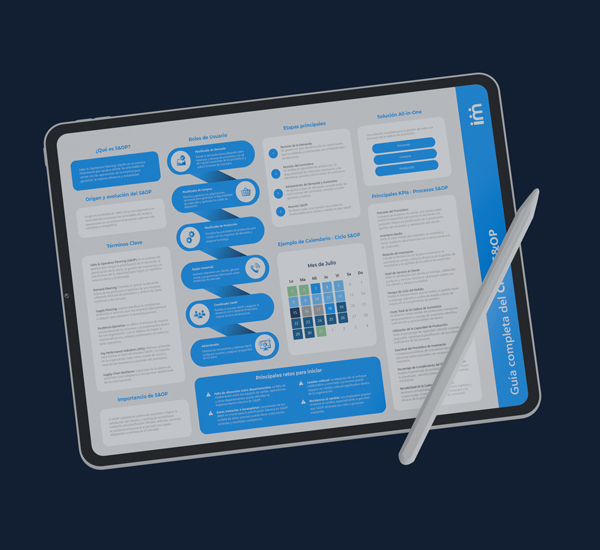
Supply chain management is defined as the process of coordinating, integrating, and optimizing all operations related to the manufacturing, procurement, transformation, and distribution of goods and services. This process encompasses aspects such as material handling, financial aspects, and the smooth transfer of information from the initial supplier to the manufacturer, through the wholesaler, retailer, and ultimately to the end consumer.
The essence of supply chain management lies in coordinating logistics to a certain point, such as the transportation of goods to a factory. In this way, each of these components can be optimized: from operational management, order fulfillment, inventory retention at suppliers, information processing, permit issuance, staffing needs, financing, and planning.
Why Is Supply Chain Management (SCM) Important?
Modern supply chains play a fundamental role in improving the quality of life, as they allow consumers to acquire essential products at more affordable prices. Effective supply chain management streamlines the process of bringing products to the market and, ultimately, into the hands of consumers.
Furthermore, there are other fundamental reasons that support the importance of supply chain management:
- Satisfaction of basic needs. Through supply chain management, people have access to fundamental items such as food, clothing, life-saving medicines, and healthcare products.
- Supply of energy and electricity. The energy supply chain applies management principles to ensure that customers have constant access to the necessary energy.
- Boosting infrastructure. Interstate highways, railways, ports, and airports play an essential role in facilitating the exchange of goods between businesses and consumers.
It is important to note that an inefficient supply chain can have significant consequences. For example, a shortage of raw materials can lead to a manufacturer lacking the necessary resources to produce a highly demanded product. This scarcity can result in sudden price increases, directly impacting consumers.
How Does Supply Chain Management (SCM) Work?
Supply Chain Management (SCM) represents the effort by suppliers to develop and implement supply chains that are as efficient and cost-effective as possible. This process encompasses everything from production to product development and information systems.
Generally, SCM seeks to centrally control or link production, shipping, and distribution of a product. By managing the supply chain, companies can reduce unnecessary costs and deliver products to consumers more efficiently. This is achieved through stricter control of internal inventories, production, distribution, sales, and the inventories of the company's suppliers.
In simple terms, the overall flow of supply chain management is divided into three main categories: product, information, and finances. Each company that is part of the supply chain operates under one of these categories. Here is a more detailed description of each:
- Product flow: Involves the creation, storage, and timely delivery of products throughout the supply chain. It also includes quality controls at each product location.
- Information flow: Consists of the exchange of purchase and sale orders, as well as the update of delivery statuses. It is essential that this workflow runs smoothly, as all other processes depend on the accuracy of the information transmitted throughout the supply chain.
- Financial flow: Handles payments, inventory management, billing, credit terms, and other related financial processes.
This comprehensive supply chain management is essential for optimizing efficiency and profitability in delivering products and services to end consumers.
Benefits of Supply Chain Management
Since the term encompasses a wide range of operations, the benefits of supply chain management are considerably extensive. Here are eleven main positive outcomes highlighted:
- Increased productivity: Companies can better forecast demand and adapt to it when strategically planning and executing their supply chain operations. This improves the company's ability to adapt to disruptions, changes in the market, and shifting industry trends.
- Cost reduction: One of the most significant benefits of effective supply chain management is cost reduction and increased profitability for the company. This is because SCM allows manufacturers to assess their current manufacturing processes, identify flaws and inefficiencies, and determine the best strategy to address these issues. Once processes become more efficient, production becomes smoother, allowing for the manufacture of more products with fewer expenses.
- Customer satisfaction: Effective supply chain management helps companies establish a strong market reputation and improve their ability to meet customer needs. This not only attracts new customers but also influences their brand loyalty.
- Improved risk management: In-depth global data analysis of the supply chain can reveal potential risks, allowing companies to design contingency plans before unexpected events occur. Companies can avoid negative impacts by taking proactive measures rather than reacting to supply chain disruptions, quality control issues, or other concerns.
- Good supplier relationships: Many SCM systems include tools for comparing supplier costs and services. These tools help managers make informed decisions about supplier selection and strengthen relationships with them. Companies can determine whether a supplier is suitable by evaluating their rates, product support, and delivery capabilities.
- Consistent quality assurance: One of the key benefits of supply chain management is that it incorporates standardized quality techniques to enhance operations. This is especially important for manufacturers who have outsourced their operations to different countries with varying product standards to reduce costs.
- Continuous cash flow: Supply chain management is a crucial element in business planning. Companies must ensure that payments do not exceed income, and SCM strategies can help address cash flow issues by allowing them to evaluate their current processes, identify weak links, and determine the best solutions to resolve problems.
- Inventory management control: Excess inventory leads to the waste of unused materials, while inadequate inventory results in an inability to meet demand, resulting in business and revenue losses. A proper supply chain management system ensures that the company has an organized warehouse and inventory control system to reduce the costs of excess inventory storage while meeting customer needs.
- Optimized shipping: Shipping optimization has become a priority for supply chain executives due to rising costs. Identifying the most efficient shipping methods for small packages, bulk orders, and other shipping scenarios helps companies deliver orders to customers faster and minimize costs. Cost savings not only benefit the company but can also be passed on to customers, resulting in higher satisfaction levels.
- Strategy, knowledge, and information: Knowledge and information gained through supply chain improvements are essential for strategic decision-making. Managing supply chains and achieving the previous ten outcomes is only possible through analysis, process improvement, and growth in maturity. The insights gained from optimizing supply chains provide the knowledge that supports organizations' strategic plans for development and evolution.
Supply Chain Management Process
The supply chain management process encompasses five essential components for the creation and delivery of quality products and services in a timely manner and within established budgets. Supply Chain Management (SCM) helps companies establish clear plans for resource acquisition, manufacturing and delivery of final products, and maintaining positive relationships with consumers. The five main steps in the SCM process are as follows:
- Planning: Companies must create a plan to ensure the availability of necessary inventory for all manufacturing processes. A key consideration here is the variation in demand, which can affect the resources available to your company. Most companies use analytical tools such as material requirements planning software to help forecast supply and determine the necessary materials.
- Procurement: Companies must identify suppliers who can provide the necessary materials within budget and as efficiently as possible. At this stage, the focus is on finding the right resources and ensuring they arrive on time, without revenue loss during the process.
- Manufacturing: When creating the final product for the customer, companies must ensure that they follow requirements as closely as possible. In this phase, companies assemble, test, and package products, and then improve the production operation process based on customer feedback. Products can go through numerous iterations before the final version is delivered.
- Delivery: When delivering final products to customers, companies focus on brand image, customer expectations, and ensuring that the product arrives smoothly. It is important to ensure that products are of high quality and can be delivered to customers as efficiently as possible.
- Returns management: After delivery, companies focus on customer support, especially regarding returns and returned products. Also known as "reverse logistics," this phase is crucial to ensuring that customer relationships are not negatively affected. Ensuring a smooth return or exchange process is as important as the delivery process, as it is essential to maintaining a positive customer experience.
Imperia Supply Chain Management Software
Scattered visibility in the market and spreadsheets make it problematic to respond to changes in the market. Imperia's digital solution for demand planning provides collaborative analysis, planning, and continuous learning that helps your organization eliminate poorly designed demand decisions.
Supply Chain Planning is the solution we offer. A complete solution for managing all your supply chain processes: demand, purchasing, and production. We provide comprehensive and customized solutions through the implementation of advanced technologies such as artificial intelligence and data analysis.
When choosing supply chain management software, it's essential to consider some key factors to ensure that the chosen solution meets your company's specific needs. Here are some of these important factors to consider:
- Functionality. Evaluate the software's capabilities in terms of demand forecasting, production planning, inventory planning, interdepartmental collaboration, and data analysis.
- Integration. Ensure that the software seamlessly integrates with other existing business systems, such as ERP (Enterprise Resource Planning) and CRM (Customer Relationship Management).
- Ease of use. Usability is essential for user adoption of the software. The solution should be intuitive so that employees can quickly learn how to use it.
- Scalability. Consider whether the software can grow with your business as it expands. Scalability is key to ensuring that the software investment is sustainable in the long term.
- Customization. Check if the software allows for process and workflow customization to fit the specific needs of the company.
- Collaboration. Evaluate the software's ability to facilitate collaboration between different departments, such as sales, operations, finance, and logistics.
- Analysis and reporting. It's beneficial for the software to provide robust analysis and reporting tools for data-driven decision-making.
- Support and training. Good technical support and training options for your team.
At Imperia, we are constantly evolving thanks to our team and feedback from our customers. We understand that each company is unique, and their processes vary, which is why we believe it's essential to adapt to the specific needs of each one. Request a demo today, and our experts will show you the features that interest you most.



























































 Imperia_thumbnail.jpg)





















